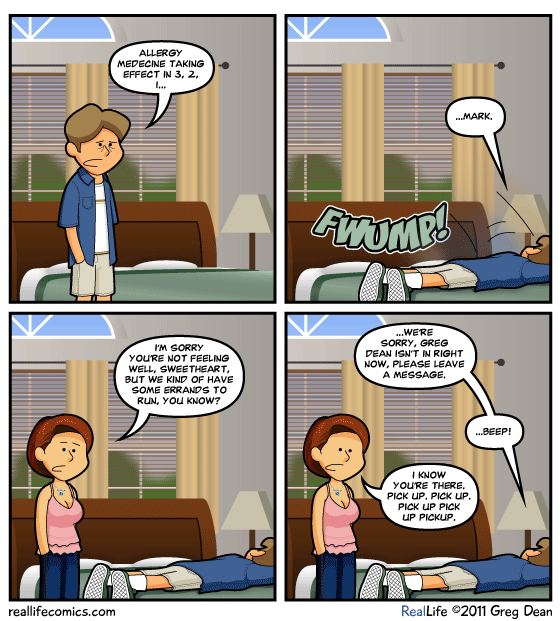“I wonder what this button does…?”
art, books, business and economy, computers, event, everyday glory, family and friends, food for thought, games, history, house and home, movies and TV, news and info, Whiskey Tango Foxtrot...?! February 17th, 2011Thursday – 17 February 2011
It’s another NBN Thursday in the valley. The sun is shining. The sky is blue. And the mountains (and a fair portion of the valley) is covered in white. That’s right: It snowed last night. Of course, that also means that the air is clear and one can see the west side of the valley clearly.
Last night, after work, I ran up to Dr. Volt’s to pick up this week’s four-color goodness before dashing back home to grab a quick bite to eat. SaraRules! had a Justice Junior League meeting and I had coffee with my friend, Frankie. While out, I had thought to kill multiple avians with a single piece of silicate and get the batteries in a couple of my watches replaced. The snow made me decide to deal with that tomorrow, on my day off.
After coffee, I headed back home – time for comfy pants and comics! – to wait for the missus to get in. I even had the presence of mind to throw in a load of laundry. When she got in, we finished watching Prince of Persia. I swear that movie had more gratuitous slow-motion scenes than The Matrix, Dhoom and Resident Evil: Afterlife combined. On the whole, it was an entertaining movie — it was kind of like a live-action Aladdin. I also found it amusing that “foreign” (or at least “non-American”) still seems to mean “just speak with an (affected) British accent” to most people. *shrug*
Chew on This: Food for Thought – Black History Month
Today’s personality is Paul Robeson (1, 2).
Paul Leroy Robeson was an African American concert singer (bass-baritone), recording artist, athlete and actor who became noted for his political radicalism and activism in the civil rights movement. Robeson was the first major concert star to popularize the performance of Negro spirituals and was the first black actor of the 20th century to portray Shakespeare’s Othello alongside an all white cast.
The son of a former slave turned preacher, Robeson attended Rutgers University in New Brunswick, N.J., where he was an All-America football player. Upon graduating from Rutgers at the head of his class, he rejected a career as a professional athlete and instead entered Columbia University. He obtained a law degree in 1923, but, because of the lack of opportunity for blacks in the legal profession, he drifted to the stage, making a London debut in 1922.
At the height of his career, Paul Robeson chose to become primarily a political artist. Increasing political awareness impelled Robeson to visit the Soviet Union in 1934, and from that year he became increasingly identified with strong left-wing commitments, while continuing his success in concerts, recordings, and theatre.
During World War II, Robeson’s support for the Allied War effort had made him the world’s most famous African-American and his previous statements and advocacy for socialism had been ignored by both the media and the white establishment. The start of the Cold war led to a social climate in which most civil rights and anti-imperialist groups in the United States were considered “Communist affiliated.”
In 1950, Robeson’s passport was revoked under the McCarran Act over his work in the anti-imperialism movement and what the U.S. State Department called Robeson’s “frequent criticism while abroad of the treatment of blacks in the US.” Under heavy and daily surveillance by both the FBI and the CIA and publicly condemned for his beliefs, Robeson was blacklisted, his income fell dramatically and he became very nearly a non-person.
Robeson’s autobiography, Here I Stand, was published by a British publishing company in 1958. As part of his “comeback”, he gave two sold-out recitals that month in Carnegie Hall, which were released on LP and later on CD. They were his only stereo recordings.
Also that year, Robeson’s 60th birthday was celebrated in several US cities and twenty-seven countries across Europe, Latin America, Asia and Africa, as well as in the Soviet Union. Later, in May 1958, his passport was finally restored and he was able to travel again, after the U.S. Supreme Court ruled, in Kent vs. Dulles, that the Secretary of State had no right to deny a passport or require any citizen to sign an affidavit because of his political beliefs.
By 1965, he was forced into permanent retirement. He spent his final years in Philadelphia, Pennsylvania, unapologetic about his political views and career.
Stray Toasters
- Created Equal
- Jim Lee on the Beginning of DC Universe Online
- Retired Superheroes (courtesy of
)
- Retired Superheroes (courtesy of
- From the “Whiskey Tango Foxtrot…?!” file: Goldfish killer “didn’t want to leave witnesses”

- International Pillow Fight Day
- The Hard Luck and Beautiful Life of Liam Neeson
- U.S. Government Shuts Down 84,000 Websites, ‘By Mistake’
- Detroit Will PAY You to Take One of These 100 Abandoned Houses
Back to it.
Namaste.
Leave a Reply
You must be logged in to post a comment.

